| |
"Go to film school, go to a good film school. Spend as much time as possible in art museums… and really look at composition. It's important
to have a literary background so that you have a basis for criticism.
Anybody who wants to be a director, they should take an acting class..." |
| |
|
Isn't it just grand when you re-visit a film you've admired and rated highly, to return to it with a nervous anticipation that it will not stand up as it does in your memory and it not only equals that memory but effortlessly surpasses it? The Manchurian Candidate is an absolutely first rate cold war thriller with some knockout performances, a quite stunning screenplay (by George Axelrod) and two twists that still shock after all these years. It also has one of the most unusual 'girl meets boy' scenes in cinema history, often remarked upon filtered through a conspirator's agenda in film academia. But we'll get to that in a paragraph or two. So what's the story?
It's the early 1950s. A U.S. army patrol is ambushed in Korea during the war between the north and the south (this was a time when the United Nations believed in the domino effect of Communism and sent American troops in to halt the march from the north). The men are not killed but placed in an elaborate programme to permanently subsume their personalities and to brainwash selected individuals to accept and carry out any commands their captors demand of them given activation images and code words. In a chilling scene ostensibly set in a horticultural club discussing hydrangeas, the brainwashed soldiers accept the fabricated reality as one of their number, a terrific and ice-cold Laurence Harvey, calmly executes two of his comrades. On the mere mention of his name, his brothers-in-arms immediately and robotically chant the mantra "Raymond Shaw is the kindest, bravest, warmest, most wonderful human being I've ever known in my life." It's an extraordinary sequence, the first time I saw blood splatter on screen and thereby something that sticks (yes, an all too appropriate verb) in the memory. The reality, of course, is that the men are being paraded in front of the board of the Korean counter-intelligence community and their Russian counterparts are asking for proof of just how far the mind conditioning goes. The cold, emotionless murders are committed without remorse and without any inherent moral correction. These men are profoundly controlled puppets and only their subsequently uncontrolled subconscious set free in elaborate nightmares can alert them to this fact.
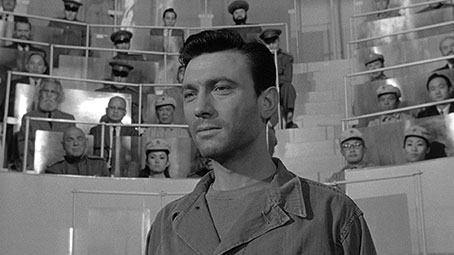
Major Bennet Marco (Frank Sinatra), who had a more than just actor-for-hire role on the film, is the first to suffer such debilitating dreams, the reality of which the viewer is already aware. As more members of his squadron admit to having similarly alarming experiences, the reality of the brainwashing begins to be pieced together. Working without knowledge of his compromised position is Raymond Shaw (Harvey) whose despised stepfather is a senior Republican senator whipping up anti-Red fervour deftly puppeteered by his wife (played deliciously nastily by Angela Lansbury). Shout accusations loud enough and truth or lies, they get reported which sets up a reality which should never have existed in the first place. Call a man a pedophile and despite the universal tenet of 'innocent until proven guilty', it's up to the accused to prove his innocence. Lansbury (at the time just four years older that the man she's supposed to have borne) plays Shaw's mother in a relationship with a stepfather who couldn't be more right wing, dumb or loathsome if he sported a curly, thin moustache and twiddled it relentlessly. Lansbury is absolutely superb, playing a mother with serious and incestuous designs on her cold offspring (an idea that simply couldn't be committed to film at that time). Yes, this is the same Angela Lansbury who floated around in Bedknobs and Broomsticks and made her TV fortune playing the lead in Murder, She Wrote. I find it not a little remarkable that her real life husband, Peter Shaw shares his name with her fictional son she seems so conflicted with in the movie. A single mother to son lips to lips kiss is all that we have to go on within the film itself as far as the incestuous subtext goes but that's uncomfortable enough. The source novel is a little more explicit – or so I'm reliably informed (paternal abuse leading to skewed emotional need). I've not read the original novel by Richard Condon but apparently it's a cracker.
So the scene is set. Shaw is primed to do something heinous… Sinatra is on his tail but no army bigwigs believe him… Shaw's trigger subsuming his free will, his "Oh, I am now in complete subservience to my conditioning," is the image of a playing card, the Queen of Hearts. It's suitably heartbreaking to see a man so completely controlled wiping out any normal moral correction. But boy, what drama is milked from this premise. The one face from the past horrors that comes to America to maintain Shaw's on the right, Red track is Henry Silva. You may not know the name but the face, the Asian DNA and yet overtly American countenance will be familiar to you. Here, he is a villain par excellence. When Sinatra is suddenly confronted by him (literally the man of his dreams), he lashes out. The following scene is credited as being the first eastern martial arts fight in western cinema and while the Wachowski siblings have nothing to concern themselves about (that is aside from the deluge of poor reviews of Jupiter Ascending), it's a hell of a fight scene. And it's believable that Sinatra got hurt performing it. It's cited that his subsequent hand injury was the reason he pulled out of Dirty Harry… Wow, hard to imagine Harry without Clint… But then again, the movies were nine years apart so perhaps that's not true (curse the web)…
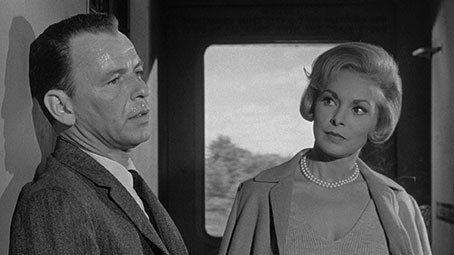
Let's take a look at one of the film's more famous scenes and rightly so. Apparently taken from the source novel, the dialogue between Sinatra and Janet Leigh in the train car is a masterpiece of depth, flirtation and subtlety. Some have other less positive opinions on this meeting. It's been argued that Leigh's character Eugenie Rose is part of the conspiracy but there's no evidence for that. Here is a woman (and certainly one of my favourites of her generation, an actress whose choices have placed her in a number of classic films) who takes an immediate shine to a man who cannot even hold a cigarette long enough to light it. Sinatra is broken and her heart goes out to him but in this era, it wasn't done for a woman to proposition a man directly. She has to use guile. If Janet Leigh propositioned me in 1962 I'd have to pinch myself – at one year old, I wouldn't have been able to appreciate the gesture. She waits until Sinatra leaves the train car and standing mid-carriage she lights a cigarette for him… There follows a conversation that could easily be read in many ways… I think it's just a smart woman getting to know the target of her affections… Here's a snippet of the dialogue…
Eugenie: |
Maryland is a beautiful state. |
Marco: |
This is Delaware. |
Eugenie: |
I know. I was one of the original Chinese workmen who laid the track on this straight. But, nonetheless, Maryland is a beautiful state. So is Ohio for that matter. |
Marco: |
I guess so. Columbus is a tremendous football town. |
Some people have suggested the scene was deliberately badly written to evict a useless character from the story. Leigh's Eugenie is Sinatra's passport to mental help. That's not a useless character. I found the scene tremendously unusual and even unique in the annals of screen romance. It's also tremendously liberating to see a beautiful woman fixating on a goal and going after it with such aplomb. Such beautiful women in those days simply existed and that was enough for a man to come running. It's a credit to her character that hers is the number called after Sinatra is briefly arrested for his fight with Silva mentioned earlier.
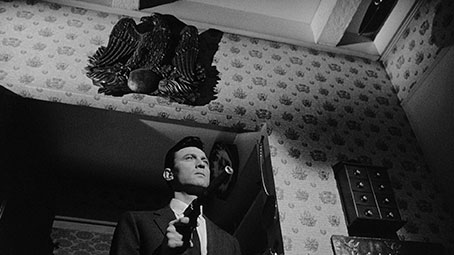
The screws are slowly turned. We have a brief but telling flashback showing Raymond at his most carefree (his first love was a democrat's daughter). The mentally healthy relationships he forms with Leslie Parrish and John McGiver (daughter of Senator Thomas Jordan and Jordan respectively) signal an emotional crack in Raymond's staunch defences. It's the only time in the movie where he seems to act like a human being. Yes, he gets drunk with Sinatra (avoid this scene if you have an aversion to the word 'lovable') but most of the time Raymond Shaw is in either his programmed murderous character or his cold and distant self. His icy demeanor may even have been the progenitor of the stiff assed British all-purpose bad guy. He could be Hans Gruber's (Alan Rickman from Die Hard) father. Up until the point of witnessing Shaw's priest disguise, you really have no idea how the dénouement will play out. You're not getting any spoilers from me but I will say that as shocking as the ending is, it's a perfect way for the movie to play out. It ties a very neat bow satisfying one aspect of the film that is initially ignored once Shaw is known to be under outside control.
Despite our oft-declared disdain for remakes, I must admit that Jonathan Demme's 2004 Manchurian Candidate is a solid updated effort blessed with a tremendous cast (Denzel Washington as Marco, Live Schreiber as Shaw and Meryl Streep as his mother) and there are enough narrative changes to the original to make it interesting and removed from its powerful forerunner. Demme has the luxury of flagging the incest a little more boldly – the mother to son kiss is still there but the masterful cut on Streep as she moves in for a second tells you much more than a fully fledged, graphic scene of perverted lust. But the original film still feels relevant, edgy and dark and despite its age, it stands up shockingly well. If you're into conspiracy thrillers, The Manchurian Candidate is in the top tier and I cannot recommend it highly enough.
This bit's a quote from the accompanying booklet: "The Manchurian Candidate is presented in an aspect ratio of 1.78:1. The High Definition master was produced by MGM and made available for this release through Hollywood Classics. Additional picture restoration was performed under Arrow's supervision at Deluxe Restoration, London." The first thing I'll note, just to get it out of the way, is that aspect ratio, which I'm guessing is a slight side-crop or a vertical expansion on the original 1.85:1, a tweak that is becoming increasingly common on modern restorations. That aside, it looks great, with the monochrome image having a generous tonal range, crisp black levels and no-burn-outs on the whites, and attractively balanced contrast that intermittently toughens up to film noir levels. The picture detail is impressive, particularly on two-shots and facial close-ups (except the two of Frank Sinatra where the poor camera assistant messed up – see below) and there's hardly a dust spot in sight and no trace of any damage. Film grain is fine and shows no sign of DNR. A handsome job in all respects.
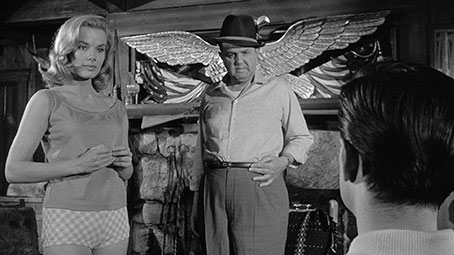
The Linear PCM mono 2.0 soundtrack has the expected treble bias and a low level but audible background hiss, but is otherwise in fine shape, with the dialogue, effects and music all clearly rendered.
Optional English subtitles for the deaf and hearing impaired are available.
Commentary by John Frankenheimer
Given that Frankenheimer is no longer with us, this would by default be a valuable inclusion, but the detail on the making of the film he delivers makes it an essential companion to the film. After outlining how he came to the project and how Sinatra came on board (an amusing story that gets repeated elsewhere), he then deals with the film itself on a scene-by-scene basis, explaining the technical details of how shots were created (right down to the lens used in places), highlighting the contributions of his collaborators, and clarifying his intentions in specific scenes. The work of the lead actors is particularly praised, and I found it rather gratifying to learn that Sinatra was looking forward to doing the fight scene from the moment he signed on to do the film. Frankenheimer also reveals that a close-up of Sinatra, one that attracted critical plaudits for having a subjective 'brainwashed' look, was actually out of focus because of a mistake made by the camera assistant and the fact that Sinatra's performance in the retakes was just never as good. There's a great anecdote about the screening of the film in a Greek amphitheatre, and Frankenheimer still marvels that Laurence Harvey marched straight into the lake in Central Park, despite it being the coldest New York Day in 30 years and them having to break the ice with bulldozers and shovels in preparation. The film, he tells us, was shot in 41 days and was probably one of the most enjoyable experiences of his life. Great stuff.
The Directors: John Frankenheimer (58:32)
I'm starting to wonder if Arrow have bought a job lot of episodes from the American TV series The Directors, which ran from 1999 to 2002, on the basis that sooner or later they're going to be putting out at least one film by almost everyone profiled. Either way, they make for interesting if occasionally frustrating viewing, usefully outlining a specific filmmaker's career, but highlighting only specific films and skipping over ones you'd like to see explored in more depth, with the excellent Seconds getting only a fleeting mention here. It's still good stuff, built around a most engaging late-career interview with Frankenheimer (who apparently died before the show was aired) and peppered with appreciative contributions from some of his past collaborators, including Kirk Douglas, Rod Steiger, Angela Lansbury, Roy Scheider and Samuel L. Jackson.
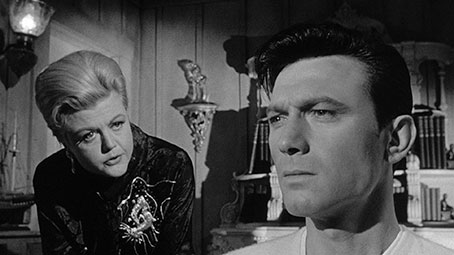
John Frankenheimer, Frank Sinatra and George Axelrod (7:48)
An archive interview in which Frankenheimer, Sinatra and screenwriter George Axelrod were reunited to reminisce about the film. Frankenheimer credits Sinatra's enthusiasm for the project as being the principal reason that it got made at all, while Sinatra insists that it was the result of three people who believed in what they were doing and remembers it as a wonderful experience. There's specific praise for Laurence Harvey and Angela Lansbury, and Sinatra recalls breaking his finger in the fight scene and holds his hand up to reveal the still visible result.
Queen of Diamonds: Angela Lansbury (14:51)
Shot by MGM, presumably for an earlier DVD release (it, like most of the extra features here, is framed 4:3), this interview with leading lady Angela Lansbury revisits some of the ground covered in the previous extras but from a different perspective, and adds some new stories. She particularly admires the train corridor dialogue scene between Sinatra and Janet Leigh, and tips her hat to Laurence Harvey for his hesitance-free walk into the icy lake in Central Park.
A Little Solitaire: William Friedkin (13:17)
A big fan of the film and an admirer of Frankenheimer the filmmaker (whom he calls "the most important director of my generation"), Friedkin discusses the elements that for him make The Manchurian Candidate such an important film. The performances once again come in for enthusiastic praise – he describes Sinatra's work as "flawless" – as does the editing of the brilliant Ferris Webster, whose astonishing CV includes Forbidden Planet, The Magnificent Seven, The Great Escape and The Outlaw Josey Wales, to name but a few. Friedkin also reflects on the grimly prophetic nature of a film that portrayed a presidential candidate being targeted for assassination just a year before John F. Kennedy – himself a big fan of the novel on which the film was based – fell victim to such an act.
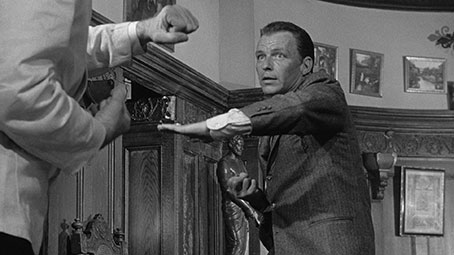
Theatrical Trailer (1:56)
An utterly intriguing sell that strips the clips of their sound and underscores them with the sort of music score that makes the film look like a full-blown surrealist drama.
Booklet
As the race hots up between Masters and Cinema and Arrow to see who can produce the best booklets to accompany their releases, I'm not sure there will ever be an outright winner. Both distributors deliver impeccably produced documents with knowledgeable and detailed content, and the one that accompanies The Manchurian Candidate is absolutely no exception. It kicks off with an essay on the film by Peter Knight, one that thoughtfully includes a spoiler warning and discusses the process of brainwashing and how the film's portrayal of it is echoed by the real world examples. This is followed by extracts from a number of contemporary reviews, most of which are very positive, though The Daily Express (ha!) calls it "A frivolous piece of hysteria." The subject of brainwashing is explored in even more detail in a fascinating, lengthy and meticulously researched article titled The Facts Behind the Fiction by Neil Sanders. Credits for the film and some quality stills have also been included. Excellent.
A key film from one of America's too often undervalued filmmakers, one that still seriously impresses over fifty years after it was first released, as much for its character and narrative complexity as its impeccable technique. It also showcases Frank Sinatra the actor at the very top of his game, and for that alone should be considered essential viewing. A most welcome addition to Arrow's already remarkable 2015 slate, it gets the transfer it deserves here and is backed up by some damned fine extra features. As my fellow reviewer states above, this comes highly recommended.
|